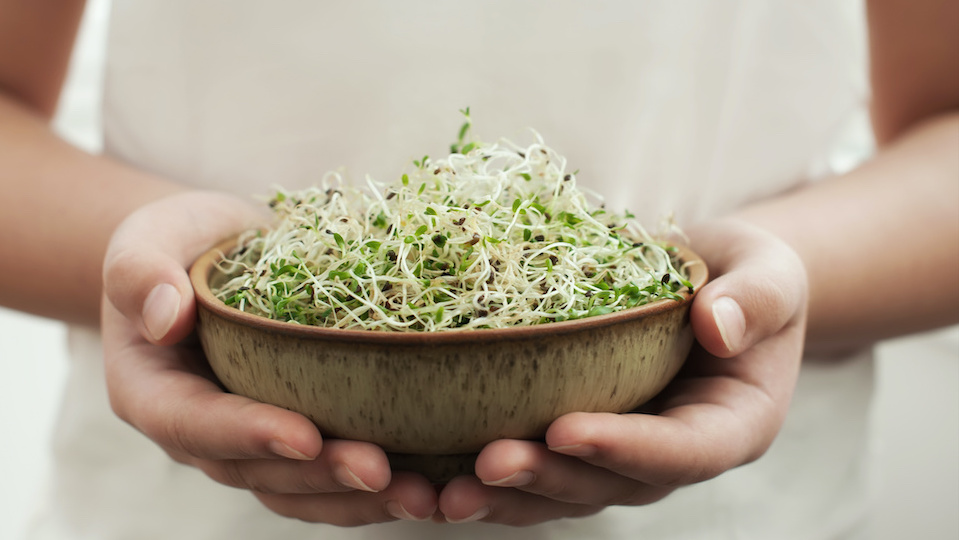Sprouts are seeds that have been germinated in water. They form a tiny root and shoot that can be consumed in its entirety. These baby plants are a nutritious food you can grow all year round – no soil needed. Some of the most popular types of seeds to sprout include radish, alfalfa, pea, sunflower, and mung bean. Broccoli sprouts have also become increasingly popular due to their health properties.
There are so many reasons to grow and eat more sprouts; you’ll be convinced before you know it. Here are some of the reasons we love growing sprouts:
Sprouts are super nutritious
When seeds, grains, and legumes are sprouted, they become more easily digestible. The tiny sprout plants contain valuable nutrients such as sulforaphane, isothiocyanates, glucosinolates, enzymes, antioxidants, and vitamins that are proven to be effective against the signs of aging, inflammation, and chronic disease. Since the plants are consumed at the beginning of their life cycle, the nutrient concentration is very high. For example, three-day-old sprouts of broccoli contain 10–100 times higher levels of cancer-fighting compounds than the corresponding mature plants.
Sprouts are alkalizing
According to traditional medicine practices, eating more alkaline-forming foods, such as fresh vegetables is believed to help balance the body and fight disease. Sprouts are a fresh, living food, full of chlorophyll, a compound which is known to fight cancer.
Sprouts help you eat a varied diet
Many of the vegetables we eat daily are from a limited few species. For example, broccoli, cauliflower, cabbage, Brussels sprouts, kale, bok choy, collards, and turnips all come from the same family of vegetables, so you may not be getting as much variety as you think. Therefore it’s essential to branch out and consume a wide variety of species, which is easy to do when you grow sprouts from different plant families. For example, lentils, mung beans, red clover, fennel, and alfalfa are all from different families and can be easily grown as sprouts.
Sprouts add flavor and color to your plate
From bright green to deep purple, sprouts come in many colors. They can be sweet, herbaceous, bitter, spicy, or aromatic, helping you add more adventure to your daily meals.
Sprouts are quick to grow
Since they produce an edible product in just 3 to 7 days, sprouts are great for impatient gardeners, so you enjoy the products of your labor quickly without losing interest. They are also a wonderful culinary science experiment for kids.
Sprouts grow in small spaces
Sprouts hardly take up any space and grow indoors easily. No retaining walls, tilling, or vast garden beds are needed to grow a healthy supply of your own food.
Sprouts are affordable
For just a few dollars and some simple equipment you already have in the kitchen, you can easily grow a healthy supply of sprouts.
Sprouts are clean
For those who want to grow food without getting their hands dirty, this is the perfect project. Sprouts are grown in water, with no soil involved whatsoever.
Sprouts provide easy access to fresh food
If you can’t afford much fresh food, don’t have easy access to a good grocery store, or if it’s the dead of winter, you can still eat fresh, green food with your little home sprout garden.
Sprouts are “green”
Yes, they are physically green, but sprouts are also a very environmentally-friendly food since they are grown about as local as it gets (your kitchen countertop!) which makes them great for reducing your carbon footprint.
Sprouts can be grown organically
Seeds are cheap and readily available, and they produce 15x their own weight in fresh food for the family.
Sprouts save on food waste
In an age where a third of our food gets wasted, sprouts are a food where you can eat the whole thing, from seed to leaves, without wasting a single bit.
Sprouts are always in season
Growing sprouts helps you avoid buying overpriced out-of-season produce from the grocery store. Who needs strawberries in January when you’ve got vitamin-C rich sprouts fresh from your mini home garden?
Sprouts build self-reliance
Growing and eating sprouts means you can provide more of your own food, reducing reliance on commercial supply chains, and improving food security for your family. In addition, the seeds store well, so they are a good emergency food.
Now that you are fully convinced and excited to begin growing your own sprouts, let’s learn how to get started.
Selecting seeds for sprouting
Growing sprouts starts with the seed selection. If possible, you should aim to buy certified organic seeds since these are grown and cleaned safely to ensure they are free of pathogens. On the other hand, conventionally grown (non-organic) seeds may have been soaked in a bleach solution and sprayed with fungicides to prevent rodents from eating them during storage.
When choosing from organic seeds, look for seeds labeled “for sprouting” as these have a much higher germination rate than regular seeds.
Try sprinkling your sprouts on salads or soups, or use on top of sandwiches, wraps, or add to stir-fries.
-Liivi Hess




